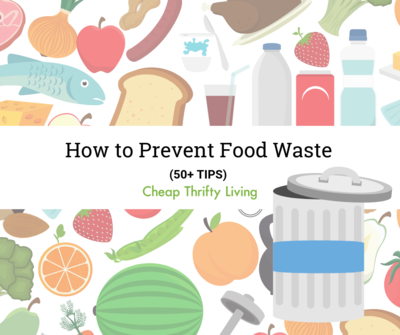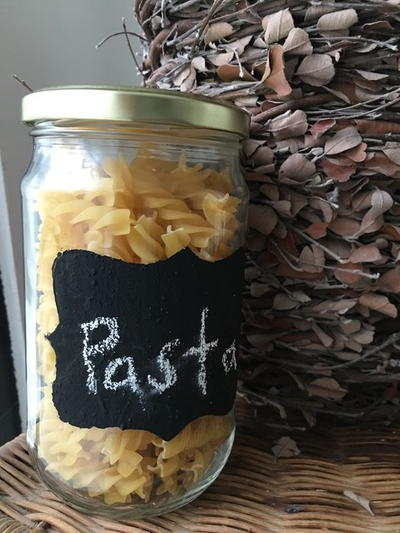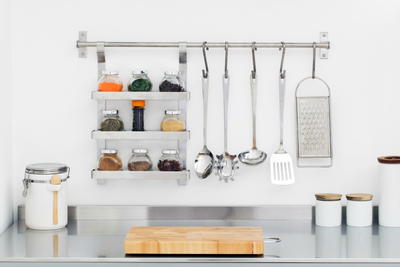50+ Ways to Prevent Food Waste at Home
Stop throwing food away! Check out our tips for better meal planning, smarter shopping, and food storing tips.

Just about every home in America throws some kind of food out every single week. Whether you find yourself tossing expired produce or scraping out a Tupperware of leftovers you left lingering in the fridge for too long, the sting of tossing out food can be a rough one, especially for those who are budget savvy and tight on money. Throwing away food is the equivalent to throwing away money. No one wants to do that! Look out below for some tips on how to prevent food waste in your home.
We've got tips for smarter planning, more economical shopping, better storage tips, and even ways to prevent food waste while you're eating!
Facts About Food Waste
We're all guilty of some degree of food waste. In fact, 1.3 billion tons are thrown away every single year. That's nearly 1/3 of all of the food we grow! The ecological impact of this can be pretty staggering, not to mention the impact it has on your wallet and money wasted. The United States alone wastes nearly $160 billion in food every single year. Surprisingly enough, the largest share of this wasted food is dairy which accounts for $91 billion of those wasted dollars.
Surprisingly enough, wealthier countries like the US and Canada are the worst offenders. In the US, 40% of this wasted food is thrown away by consumers. Meaning people purchased the items and then tossed them.
Benefits of Reducing Food Waste
Our article focuses on how to reduce food waste in your home. This will save you a ton of money in the long run. But did you know reducing food waste at home can have a national and even global impact? Food waste is at fault for a huge portion of the pollution and landfills in the US. So, saving yourself money could even save the world.
Saving Money
Throwing away food means you're throwing away money! If you don't use up all the food you buy, you have wasted money. The US wastes over a billion dollars in food waste a year. Imagine what curtailing this waste could do for our economy!
Reduces Methane Emissions
The more food in a landfill, the more methane gas is emitted into the air. This can lead to greater air pollution, growing landfills, and decreased air quality.
Reduces Pollution
Throwing away food leads to an increased production of food. This can lead to increased pollution from growing, manufacturing, packaging, and shipping foods.

How to Reduce Food Waste At Home
There are a ton of little things you can do to prevent food waste in your kitchen. The truth is food waste is a pretty complicated issue just like cooking! Different foods are wasted for different reasons. Preventing or, at least, reducing the amount of food that gets tossed is a different process for everyone. Some people need to change their meal planning habits while others need to reconsider what they buy when they shop. This is why the tips below are divided into every step of the process: meal planning, shopping, cooking, eating, and throwing away food!
A great place to start is changing your habits in just one of these areas before moving on to the next.
While Meal Planning
If you're looking to reduce your food waste at home, the best place to start is meal planning. By adjusting how you meal plan (or just starting to meal plan), you will be able to save a ton of money by ensuring that you use up all the ingredients you spend your money on. Meal planning is not a one-and-done sort of process. It is something you should always be working to improve upon by keeping tracking of your meals, expenses, and ingredients every single week.
If you are brand new to meal planning, check out these Printable Meal Planning Sheets from our friends at RecipeLion.com!
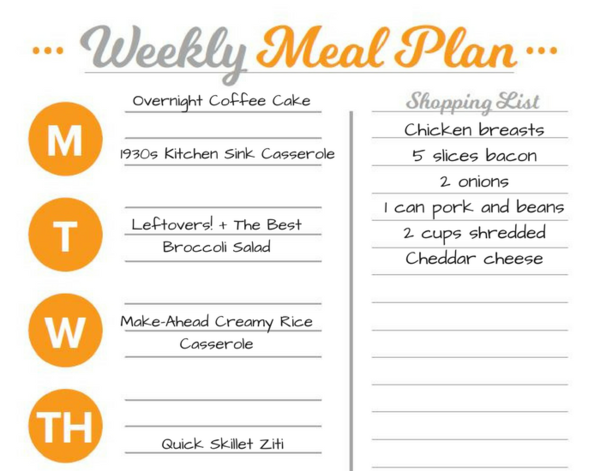
- Keep a running list of meals your family eats and likes. This prevents you from making dishes you will ultimately toss.
- Always plan your meals around how many meals you will actually eat at home. Do you have dinner plans that week or a free lunch plan coming up at work? Make sure to plan for it.
- If you do plan to go out to eat that week, consider working those leftovers into your meal plan for a lunch. There's no need to let that leftover Chipotle go to waste.
- Meal plan around what you have at home (in the fridge and in the cupboards) instead of what you plan to buy.
- Always include the amount of an item on your shopping list so you don't overspend.
- Update your regular recipes whenever possible for the perfect portion. Take note of when you ended up tossing leftovers and make less the next time.
- Plan meals to use up all of your purchased food. If you buy something in bulk (like meat or veggies), make sure several meals that week use that ingredient!
- Keep a sticky note on your fridge of items you throw out. If they end up on the list 2+ times, consider removing them from your shopping list or finding a more economical way to store the ingredient (like freezing).
- Only buy fresh veggies and fruits that you know you are going to eat and are a part of your meal plan.
- If you are planning to be out of town for a significant amount of time, plan ahead and make sure you will use up or freeze all perishables before you leave.
- Plan one "use-it-up" meal a week where you are required to use up leftover ingredients in your fridge and cupboards. This works best at the end of the week and/or the day before you go grocery shopping.
While Shopping
Following your meal planning and shopping list to the letter is an excellent way to make sure you do not overspend or buy products that will go to waste. Still, there are some tips to follow while shopping that can prevent food waste. Buying the right food and the right amount is almost as important as having a plan.
- Whenever possible, consider buying frozen foods that will keep for much longer.
- ALWAYS check the expiration and use by dates on food when you are purchasing it. Try to find the freshest item you can.
- Keep track of when your favorite grocery store stocks their shelves so that you can shop on days when the food is freshest. This means it will last longer at home.
- Make sure to have a snack or meal before grocery shopping to avoid impulse buys.
- If you are not planning on eating something shortly after your shopping trip, consider buying the non-organic product. Organic food often expires quickly as it lacks the preservatives other products contain.
- Shop more often! This means you can buy fresher ingredients. Plus, quick "in-and-out" shopping trips might ultimately save you money since they require you to spend less time in the store, meaning you'll be browsing fewer shelves.
- Buy blocks of cheese to shred and slice at home. Blocks of cheese last much longer than pre-shredded and sliced products. They're cheaper, too!
- Buy the ugly produce! People tend to be perfectionists and buy the perfectly shaped and proportioned produce which means the ugly ducklings get tossed in the garbage. This tip prevents food waste overall though some stores like Walmart and Whole Foods offer this produce at a discount.
- If you have a small family or live alone, consider finding a shopping buddy you can split produce with each week.
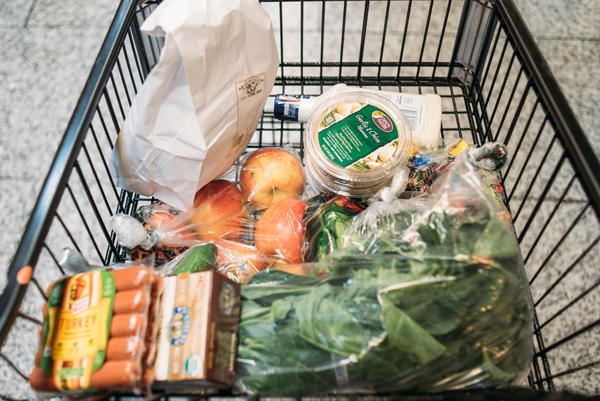
While Storing Your Food
Buying the right amount of food and produce is one thing, but making sure it lasts is another. Check out our list of ideas for storing food to prevent food waste. From proper storage to freezing tips, these ideas will help your food last longer.
- Chop and dice produce as soon as you get home and freeze it.
- Wait to wash your berries and other produce until right before you eat it or cook with it. This can help prevent molding.
- Keep a running list of foods and when they expire on your fridge so you have what to use ASAP. Don't be afraid to keep foods a few days after their expiration date, so as to maximize their usefulness. You can find out how long you can keep food here.
- Store foods that produce gases while ripening away from other produce. This gas (ethylene) will lead to ripening and spoiling of foods around them. Many fruits and veggies produce this gas.
Foods that produce ethylene gases: bananas, avocados, tomatoes, melons, and green onions.
Foods that are ethylene-sensitive: potatoes (all types), berries, peppers, leafy greens (spinach, kale, lettuce)

- Make sure to keep your kitchen cool whenever possible. If you live somewhere where your heating system makes your place extra toasty, consider turning down the heat in that area of the house.
- Store more foods in the fridge in the summer if need be. If your house warms up in the summer and you do not want to run the AC, consider storing some of your cupboard foods (like bread, potatoes, etc.) in your fridge to prevent the heat and humidity from spoiling them.
- Set phone alarms or mark in your planner when food expires/when to freeze it so you avoid neglecting to freeze your food.
- Store food in your fridge and cupboards with the FIFO (or first in first out) method by placing the oldest items at the front of the fridge where you are more likely to grab them. This helps prevent you (or your family) from opening new packages before the old was finished.
- Consider canning fruits and veggies so that they last longer. Check out this article on How to Water Bath Can from our friends at Cookstr.com.
- Make to store your food correctly. This means making sure everything is in the proper drawer and stored in airtight containers.
- Buy better Tupperware/freezer containers. While it is a thrifty option to reuse old food containers like plastic butter tubs, these tubs are not built to last and will not be airtight after a few uses. Investing in good tupperware will save money in the long run.
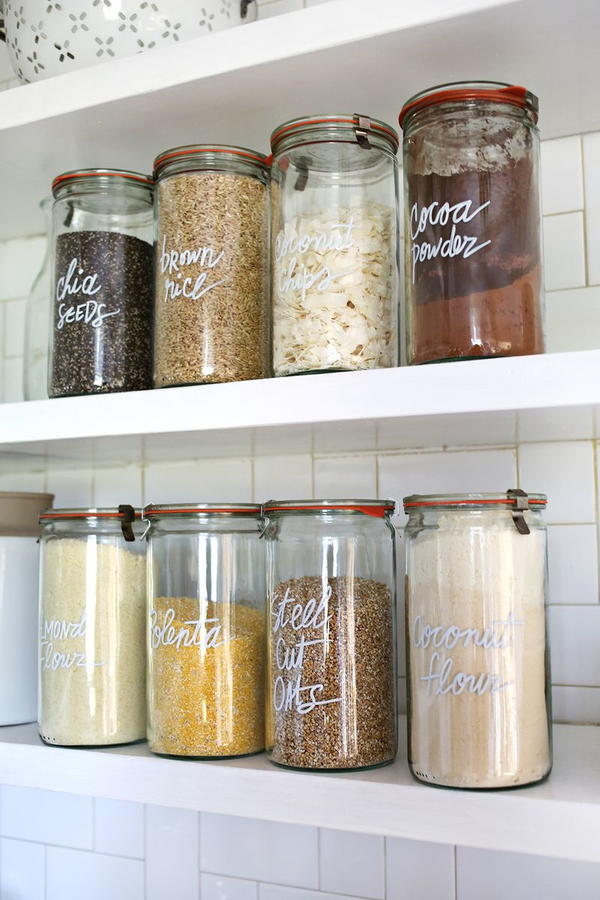
- Store food in clear containers. If you can see what's inside, you're more likely to use it up!
- Make sure you have a healthy fridge! Inspect your fridge monthly to make sure that the seals are functioning properly and the temperature is set correctly.
- More food in the fridge? Adjust the temperature down. A crowded fridge means that there are more things to keep cool.
- Try not to overcrowd your fridge. Too much food in your fridge can mean that things are not cooling down properly. Do not overcrowd it. If you find this is happening, consider freezing more food and cleaning it out more often.
- Bigger families may consider investing in a second fridge for things like snacks and beverages.
- Make sure to let your food cool down on the counter before you freeze it. If food is frozen when it is still hot or too warm, there will be excess water on the food item due to condensation which can lead to freezer burn.
While Cooking
Cooking your food is half the battle! If you're using your ingredients, you probably aren't wasting them but there are tips you can use mid-recipe in order to get most out of your ingredients on hand.
- When cooking meat, make extra for upcoming meals instead of cooking portions twice. If you brown ground beef for pasta, set some aside for tacos later that week. If you cook up chicken for dinner, shred some to put on a salad for lunch the next day.
- After cooking a dish, check in with yourself if you might have needed more or less so you can plan accordingly next time. Did you make way too much and already have some frozen from the last time you made it? Or, alternatively, was the amount you cooked too much for one meal, but not enough for leftovers?
- Always check your fridge to see what you might be able to repurpose into a new meal. Oftentimes, you can turn leftovers into a new stew or breakfast scramble.
- Cook meals that store well and are easy to freeze. Chilis, casseroles, soups, and stews are great options.
- Make sure to freeze plenty of meals for your busy and low-effort cooking days to avoid ordering delivery.
- Use food that has gone "bad" but is still edible in recipes. You can easily make things like banana bread out of brown bananas and croutons out of spoiled bread.
- Freezing isn't just for entrees! If you have an excess of veggies like broccoli or asparagus, you can season it before freezing. Using a food processor to make things like pesto with herbs and cauliflower rice out of cauliflower is a great option too.
- If you live alone, cook with friends or neighbors to use up each others' ingredients.
- Keep a list of great substitutions so you know when you can use up
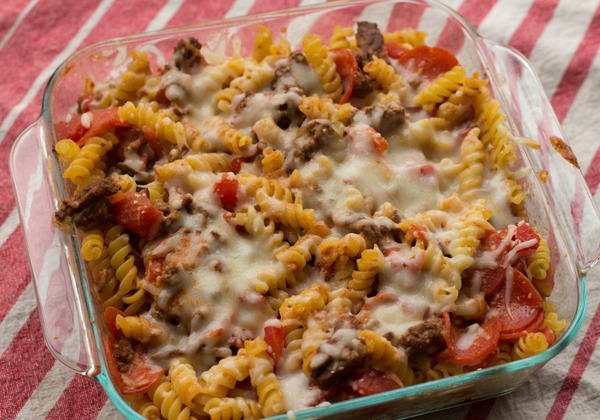
While Eating
You'd be surprised by how much food is wasted in a single meal. If you give yourself too big of portions, you'll end up scraping some into the trash. Make sure to keep an eye on food waste at the dinner table, as well.
- Try to be a member of the clean plate club by eating everything on your plate each time, so you are not throwing away food.
- Make a no-seconds until your plate is clean rule at your house. This will help kids learn that they cannot stop eating a certain dish because they are sick of it while heading for seconds on another.
- Watch your portions when dishing out food. Serve yourself smaller portions and head back for seconds instead of making a heaping dish you don't finish. This lets you freeze and store more for later.
- Make note of foods your family doesn't like! If your family picks at a dish, chances are the leftovers are going to end up in the trash. Don't make meals you won't eat again.
When You Have to Throw Food Away
The goal of preventing food waste is to NOT throw it away. There are a few things you can do with spoiled or expired food that are much better than just tossing it. Before you throw away food, consider if there's a second use for it!
- Compost whatever you can if you have a garden. All perishable foods can be composted. Either purchase a compost bin for your yard or a small in-kitchen composter. Some community gardens and parks have shared compost, as well.
- Donate food you will not use to local shelters. It can be helpful to clean out your cupboards and donate any non-perishables you might not be using. Food banks will often accept expired canned goods, as well.
- If you live in a wooded or rural area, you can leave produce that is going bad out for animals. This is especially helpful in the cold winter months when animals are scrounging for food. Just be sure to leave it a good distance away from your house so that the animals do not become a nuisance.
- Make sure to recycle! If your expired food is in a glass or plastic container, take the extra step to wash it out and put it in the recycling bin.
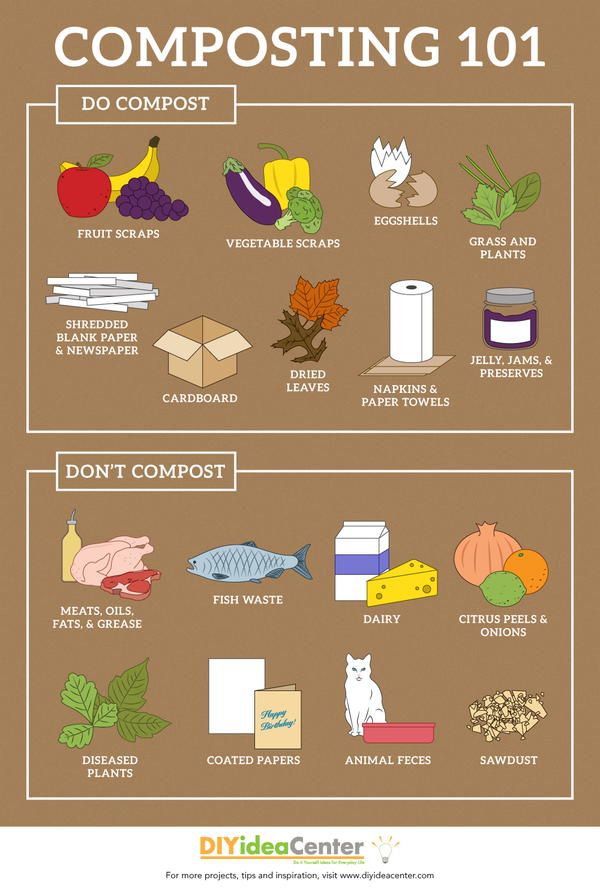
Did we miss your favorite tips for preventing food waste?
Let us know about it and we'll add it to our article.
Up Next: The Difference Between Sell By Date vs Expiration Date
Read Next12 Money-Saving Grocery Apps
Your Recently Viewed Projects
flowergirl
Nov 20, 2018
I have compiled my own list of ways to prevent food wastage at home from this list based on what I buy and how I eat during he week. I don't buy alot of groceries during the week because I eat out mostly but I do cook on the weekends. I swear by canning, especially during the summer when so many fruits and vegetables are in season so I have them when I need them during the winter. Buying frozen foods is also a great way to prevent wastage and if you have more than you need, you can always donate to those who don't.
Report Inappropriate Comment
Are you sure you would like to report this comment? It will be flagged for our moderators to take action.
Thank you for taking the time to improve the content on our site.

